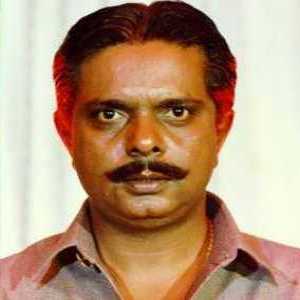Sadashiv Dattaray Amrapurkar (11 May 1950 – 3 November 2014) was an Indian actor, best known for his performances in Marathi and Hindi films from 1983 to 1999. He acted in more than 300 movies in Hindi, Marathi, and other regional languages. He also played first class cricket in Ranji trophy.
He received the Filmfare Award for Best Performance in a Negative Role in 1991 for Sadak — the first time the award was instituted. In 1993, he won the Filmfare Award for best actor in a villainous role, when the award was instituted. In 1993 he also played a comic hero, Inspector Pyare Mohan, in Aankhen. In addition to negative roles, he played supporting roles and, later, comic roles.
Early life
Amrapurkar was born as Ganesh Kumar Narwode (or Nalawade) on 11 May 1950, in Amrapur village of Shevgaon tehsil, Ahmadnagar district in Maharashtra.
Amrapurkar began acting during his school days. While completing his master's degree in history at Pune University, he was involved in theatre.
Career
Amrapurkar started his career as an actor in Marathi theatre, eventually acting and directing nearly fifty plays, before transitioning to films. He made his film debut with the role of Bal Gangadhar Tilak in 22 June 1897, a Marathi historical film directed by Jayoo Patwardhan and Nachiket Patwardhan.
He won a number of awards in theatre and film. His first film was Govind Nihalani's Ardh Satya (1983), for which he won a Filmfare Award. He has acted in more than 300 movies in Hindi, Marathi, Bengali, Oriya, Haryanvi, Telugu and Tamil. In 1993, he won the Filmfare award for Best Actor in a villainous role, the first time this award was instituted.
In 1981–82, Amarapurkar acted in a Marathi stage play, Hands-Up!, alongside stage actors Avinash Masurekar and Bhakti Barve-Inamdar. This play was successful and Amrapurkar was noticed by director Govind Nihalani, who was searching for an actor to play the central negative character in his movie Ardh Satya. The movie went on to be a hit and Amrapurkar's acting was appreciated. His style of dialog delivery was considered unique as compared to the popular Hindi movie villains in those days. Amrapurkar won a Filmfare Award for his performance in the film.
After Ardh Satya, Amarapurkar starred in Purana Mandir, Nasoor, Muddat, Jawaani and Khamosh. In 1986, he starred as the villain in the Amitabh Bachchan-starrer Aakhree Raasta. In 1987, he starred as the main villain in the Dharmendra-starrer Hukumat, which went on to be a blockbuster that grossed even more than Mr. India. From 1988 he increasingly appeared in villainous roles in films such as Mohre, Khatron Ke Khiladi (1988 film), Kaal Chakra, Eeshwar, Elaan-E-Jung, Farishtay, Veeru Dada, Naaka Bandi and Begunaah.
In the mid-1990s he migrated towards supporting roles and comic roles such as in Aankhen, Ishq, Coolie No. 1, Gupt: The Hidden Truth, Aunty No. 1, Jai Hind, Master and Hum Saath-Saath Hain: We Stand United. He played the role of Dr. Khanna in the 1996 film Chhote Sarkar. He did a number of stunning roles in Marathi films such as Kadachit, Vaastupurush, Doghi, Savarkhed ek Gaav and Ara Ara Aaba Ata tari Thamba. His last Hindi screen role was a cameo in the short film by Dibakar Banerjee, Bombay Talkies (2012).
He did a cameo in the Waheeda Rehman-starrer Swayam in 1991. He played the role of a tough, upright cop who reprimands his children for leaving an elderly widow to fend for herself on the streets. The film touched on the problems old people face with the breakdown of the joint family system. It was a subject close to Amrapurkar's heart and he did the role for free.
Amrapurkar was a philanthropist, social activist, and was engaged in a number of social organizations such as Samajik Krutadnyata Nidhi, Andhashraddha Nirmulan Samiti, Snehalaya, Lokshahi Prabodhan Vyaspeeth, Ahmednagar Aitihasik Vastu Sangrahalaya, and many others. He always had a soft spot for the rural youth and strove for their development.
In March 2013, he protested water waste during the Holi festival near his residence in Mumbai.
Amrapurkar also lent his support to the Anna Hazare movement in 2011 and was active in engaging citizens during the 2009 Lok Sabha elections by holding several discussions to make voters aware of their rights.
